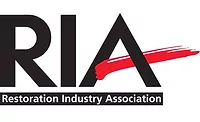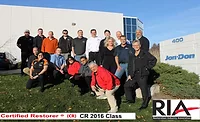RIA: Updates to the Certified Restorer Curriculum
RIA’s Certified Restorer® certification has long been considered the “Masters Degree of Restoration.” Training for the CR is structured to raise restorers to a higher level of professional ability in all aspects of fire and smoke damage repair, while encompassing other specialized areas such as water, microbial issues and contents damage.
While many call themselves “restorers,” there is a definite distinction between those who call themselves a “Certified Restorer.” What differentiates a Certified Restorer from a restorer? The short answer is that Certified Restorers are better educated in a wide range of knowledge domains and practices, while displaying specific leadership qualities.
A committee of dedicated volunteers and staff spent three years and more than 9,000 hours engaged in formally defining what the 21st century restoration professional should know when completing the CR curriculum. RIA also engaged the services of Coats Knudson & Associates of Raleigh, N.C., a curriculum design and development consulting firm.
First, the committee defined the restoration profession, then they defined and created competencies within the CR education to develop a comprehensive curriculum, while remaining true to the tenants that guided the creation of the CR decades ago.
The Curriculum consists of four knowledge “arms”: Leadership, Technical Knowledge, Scientific and Project Management. Leadership is a new element to the Curriculum. These arms comprise numerous knowledge areas on which the competencies are based and are further delineated by “levels of understanding,” which have been categorized as Mastery, Working Knowledge and Familiarity. Definitions, diagrams, formulas, descriptions, methods and references are also included.
The CR Curriculum Development Committee extensively referenced and discussed the findings from Purdue University’s published study on the restoration industry, which surveyed 275 professionals from RIA member firms – including 160 RIA certified respondents. The Purdue study’s mathematically derived results confirmed and underscored the correctness of the curriculum work, particularly in the Technical Knowledge and Project Management Arms.
The CR Curriculum has already undergone extensive revisions and is currently undergoing an unbiased review by a 25 - member Peer Review Team representing all facets from the industry. A second open-industry review and comment period will be launched from November 2013 through January 2014.
The new curriculum will be unveiled at RIA’s national convention in Orlando, FL, in April 2014. The CR Curriculum and accompanying references can be used by any education entity, teaching institution or training company that wishes to educate individuals in the restoration arts and sciences, as well as those who wish to become a Certified Restorer.
For more information on RIA programs and events, please visit www.restorationindustry.org.
RIA Legal Fund
There have been several recent developments in court cases involving RIA members and ThermaPure. Just Right Cleaning & Construction (JRCC) was recently granted summary judgment in its lawsuit with ThermaPure. Senior U.S. District Judge Robert H. Whaley found that “there is no evidence that creates a question of fact as to the correlation between [a predetermined] temperature and a targeted organism…Thus, because there is no evidence that Defendant Just Right ‘identifies organisms to target with heat’ there is no infringement of Claim No. 6.” Just Right’s Motion for Reconsideration was granted, as was the defendant’s Motion for Partial Summary Judgment.
“I have no regrets of taking on this fight,” said JRCC owner, Ben Justesen. “My family and faith have become so much more important in my life because of this hardship, and for that I am grateful. I am proud to uphold my principles and not back down to this wrongful offense.”
In December 2011, Water Out Oregon was sued by ThermaPure for patent infringement. The company chose to fight the suit rather than sign an agreement with ThermaPure or just close their doors. A year later, Water Out Oregon was the first restoration contractor to win Summary Judgment against ThermaPure. Water Out requested that ThermaPure pay their legal fees, but the judge denied the request.
“It was a long and sometimes frightening journey,” said Felix Herrada, III, president of Water Out Oregon. “We lost customers on the way, but we also gained support from others.”
RIA continues to raise funds for its effort to invalidate six of the patents held by David Hedman and ThermaPure. That case is currently working its way through the court system. For more information, visit www.restorationindustry.org.
Looking for a reprint of this article?
From high-res PDFs to custom plaques, order your copy today!






